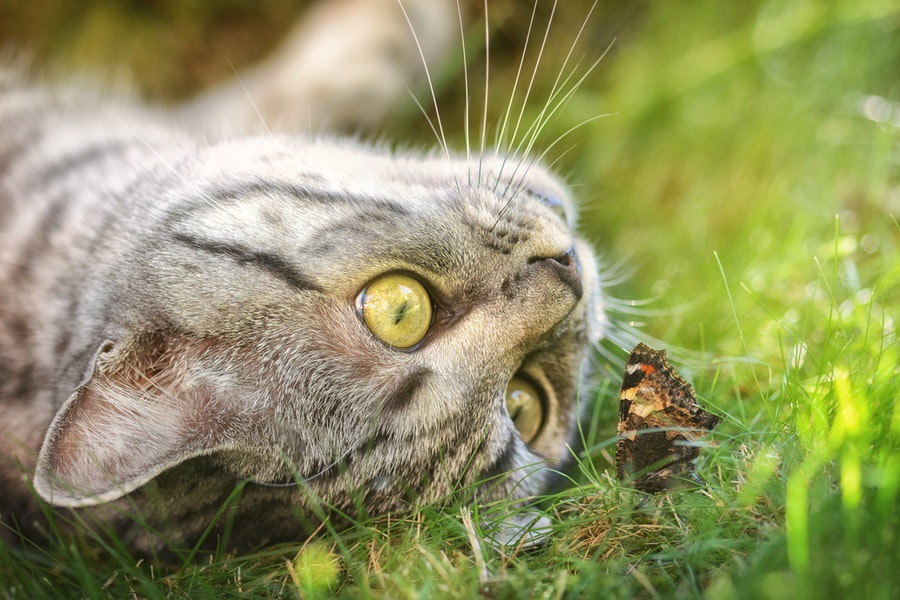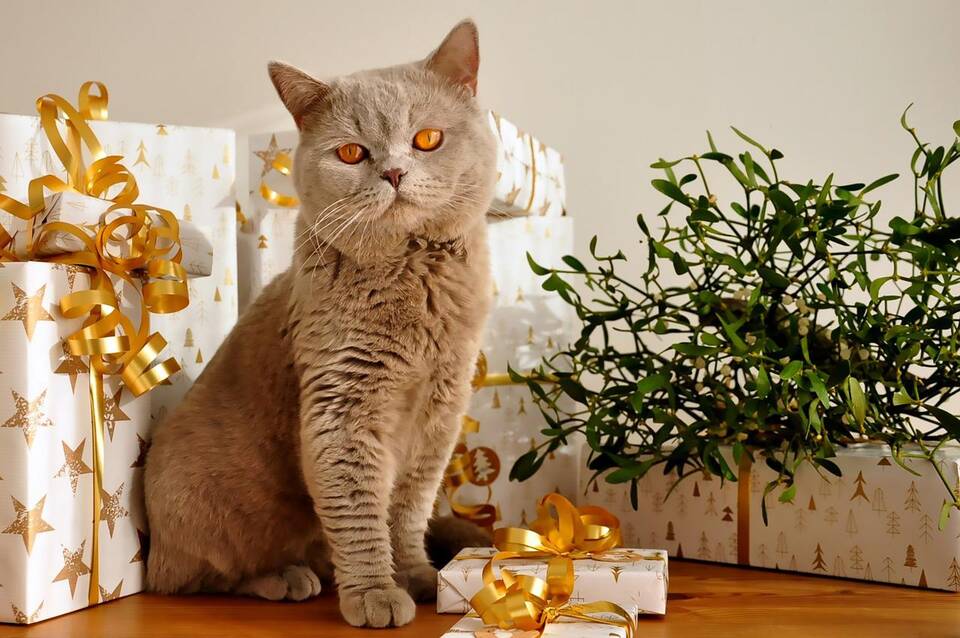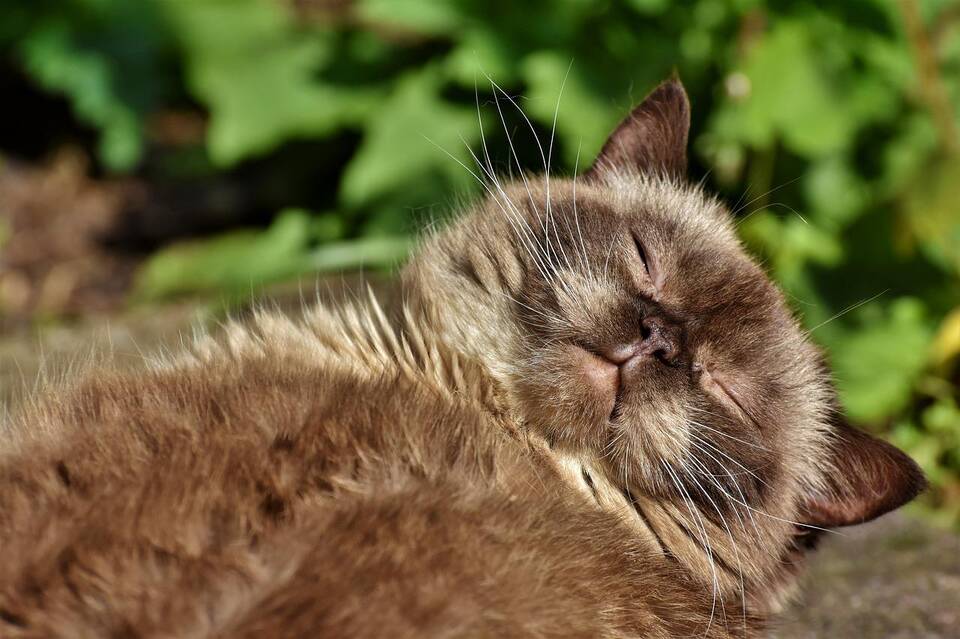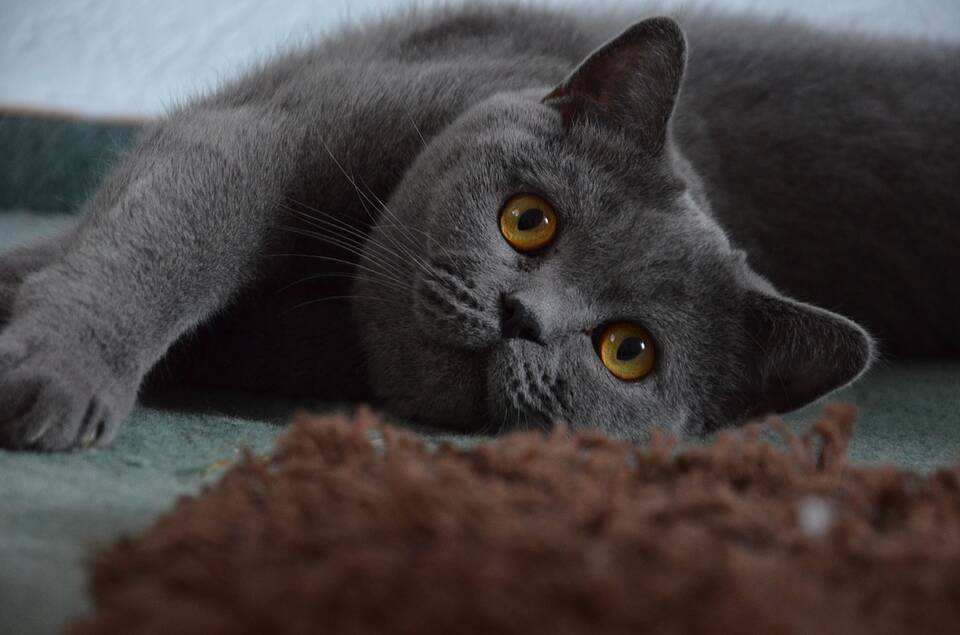Are you a proud new British Shorthair owner? Do you have plans to spoil your feline friend with the best food and toys money can buy? If so, you may be wondering what British Shorthairs eat?
In this post, we’ll take a look at the different types of food that are ideal for these furry felines. Well also discuss topics such as preparing homemade food for a British Shorthair cat, whether they can eat raw meat, giving them fruit and vegetables, and how much water you should give your furball.
So, whether you’re just starting out as a cat owner or you’re looking to switch up your Brit’s diet, read on for some helpful tips!
What Do British Shorthairs Eat?
The truth is British Shorthair Cats can eat anything. However, the question should not be what do they eat but what should they eat. As cats are obligate carnivores they should be eating food sources high in protein such as wet or dry cat food. They can also eat a variety of human food such as chicken, salmon, and other fish.
Cats Are Obligate Carnivores
Cats are obligate carnivores, meaning that they only eat meat. This is because cats have a limited ability to digest carbohydrates, so they rely on a diet of high-protein, moderate-fat foods to meet their nutritional needs.
While some people may think that this makes cats difficult to care for, it’s actually quite easy to provide them with the right type of food.
In fact, all you need to do is feed your cat a diet of wet or dry food that is specifically designed for cats.
The Nutritional Needs of British Shorthairs
Cats have a number of specific nutritional requirements, which is why it’s so important to feed them a diet that meets their needs.
Protein
First and foremost, cats need high levels of protein to support their muscle growth and maintenance.
This is why it’s important to feed them a diet of wet or dry food that is specifically designed for cats.
Cat food is packed full of rich protein sources designed specifically to support your cat’s healthy growth.
Fat
Cats also need a moderate amount of fat in their diet to support their energy needs.
Fat plays a very important role in the healthy functioning of a cat’s nervous system. It also assists in the transportation of nutrients around cells.
Vitamins & Minerals
Finally, cats need a wide variety of vitamins and minerals to support their overall health. This includes nutrients such as vitamin A, vitamin B12, and taurine.
Vitamin A
Cats require Vitamin A for the synthesis of certain proteins. These proteins are necessary for maintaining healthy mucus membranes and skin and keeping the immune system functioning at its best.
Vitamin B12
Vitamin B12 is important for cats because it helps to keep their nervous system healthy.
It’s also essential for the production of red blood cells, which carry oxygen throughout the body.
Taurine
Taurine is an important nutrient for cats, as it helps to keep their immune system healthy and supports the health of their vision, heart muscles, and digestion.
Providing them with all these nutrients is the best way to care for your British Shorthair. It will keep them strong, healthy, and happy.
Now that we know about the nutritional requirements of cats, let’s get into it and answer the real question, just what do British Shorthairs eat?
Wet Food vs. Dry Food
When it comes to choosing the right type of food for your British Shorthair cat, you’ll need to decide between wet food and dry food.
Wet food is typically higher in protein and moisture than dry food, which makes it a great option for cats who are prone to dehydration or who need to put on some weight.
Dry food, on the other hand, is a good choice for cats who are already at a healthy weight and who don’t require as much protein in their diet.
No matter which type of food you choose, be sure to look for a formula that is specifically designed for British Shorthairs.
This will ensure that your cat gets all of the nutrients they need to stay healthy and happy and prevent any health problems down the road.

The Best Types of Food For A British Shorthair
Now that you know a bit more about the different types of food that are best for British Shorthair cats, let’s take a look at some specific brands and formulas that you may want to consider.
Wet Food
If you’re looking for high-quality wet food to feed your Puss and Boots, we recommend checking out Weruva, Wellness, or Stella & Chewy’s.
These brands offer a variety of delicious recipes that are packed with protein and moisture, making them the perfect choice for cats who need to put on weight or who are prone to dehydration.
Dry Food
When it comes to dry food, we recommend opting for a brand like Orijen, which is packed with premium-quality ingredients and designed to meet the nutritional needs of cats.
Another great option is Blue Buffalo, which offers a variety of healthy recipes that are perfect for British Shorthairs.
In the grand scheme of things, it doesn’t truly matter which you go for. It’s all down to preference and what your British Shorthair likes.
So test the waters and see how they react to different types of foods.
Below we have listed some of the benefits of both wet and dry food. This should give you a few quick pointers that will hopefully help you make a decision.
But don’t worry too much about it.
Benefits Of Wet Cat Food
There are a number of benefits to feeding your cat wet food, including:
- Wet food is high in protein and moisture, making it a great choice for cats who need to put on weight or who are prone to dehydration.
- It typically contains fewer carbohydrates than dry food, making it a better choice for cats who have trouble digesting carbohydrates.
- Wet food is more palatable than dry food, making it a great choice for finicky cats.
- Wet food is easier to digest than dry food, making it a good choice for cats with gastrointestinal issues.
Benefits Of Dry Cat Food
There are also a number of benefits to feeding your cat dry food, including:
- Dry food is more convenient than wet food and typically lasts longer once opened.
- It is typically less expensive than wet food.
- Dry food is a good choice for cats who are already at a healthy weight and who don’t require as much protein in their diet.
- Also, it’s perfect for cats who are finicky eaters or who have trouble digesting wet food. This point applies to both wet and dry food.
What Human Foods Can A British Shorthair Eat?
Just like any other cat, British Shorthairs can enjoy a variety of human foods as long as they are given in moderation.
Some of the best human foods to give your British Shorthair include:
- Fish such as canned tuna or salmon
- Cooked chicken or turkey
- Hard-boiled eggs
- Fresh fruits and vegetables (carrots, green beans, blueberries, etc.)
- Rice
- Plants(as snacks)
Remember to always consult with your veterinarian before feeding your cat any human food, as some foods can be harmful or even deadly.
The foods should by no means be your cat’s staple diet. Only give your cats these foods on occasion meaning once or twice per week.
As long as it’s a part of a diet consisting of high-quality wet and dry food, then it’s fine.
Additionally, it adds variety to your cat’s diet which your cat will thank you for.
How Much Food Should I Feed A British Shorthair Cat?
How much food you should feed your British Shorthair cat will vary depending on their age, weight, and activity level.
Generally speaking, you should aim to feed your cat two or three times per day.
If your cat is overweight, you may want to cut back on its food intake and if your cat is underweight, you may want to increase it.
British Shorthair cats are known to be lazy which means they are prone to weight issues such as obesity.
However, this is no excuse for your cat to be overweight. Make sure to always monitor your cat’s weight.
Normal Weight Ranges For A British Shorthair
Below are the general weight ranges for a male and female British Shorthair cat. Use it as a general guide on how much your cat should weigh.
Males
- 3 months old: 3.9lbs – 1.8kg
- 6 months old: 4.9lbs – 2.7kg
- 12 months(adult weight): 7.7lbs – 3.5kg
Females
- 3 months old: 3lbs – 1.4kg
- 6 months old: 5.5lbs – 2.5kg
- 12 months(adult weight): 7.3lbs – 3.3kg
Homemade Food For A British Shorthair
We can’t really ask about what British Shorthairs eat without talking about homemade food.
If you want to give your British Shorthair a homemade diet, there are a number of different foods you can cook up for them.
Some good ideas include:
Homemade cat food recipes typically include a mixture of cooked meats, grains such as rice, and vegetables.
You can try making a chicken and rice casserole, tuna fish salad, or roasted pumpkin and sweet potato.
If you’re feeling adventurous, you can also make your own raw cat food diet. This involves blending uncooked meats, bones, and organs into a smooth paste.
While homemade food can be beneficial for your cat, it’s important to note that it should only make up a small portion of their overall diet.

Benefits Of Home Made Food For Cats
If you’re thinking of making homemade food for your British Shorthair.
There are a number of benefits to feeding your cat homemade food, including:
- Homemade food is more affordable than commercially prepared food.
- It’s homemade so you know exactly what’s going into it. It can be tailored to your cat’s specific nutritional needs.
- Homemade food is easier to digest than most commercial foods.
- We all love variety and so do cats. Homemade food provides greater variety than most commercial foods.
- Freshness is important and homemade food is typically more fresh and high quality than most commercial foods.
Can A British Shorthair Eat Raw Meat?
British Shorthairs can eat raw meat, and a raw meat diet can have a number of benefits for cats, including:
Raw meat is fresher and contains more nutrients than most commercial cat foods.
A raw meat diet is easier to digest than most commercial foods.
It provides greater variety than most commercial foods.
Additionally, raw meat is cheaper than most commercial foods.
However, there are also a few drawbacks to a raw meat diet for cats, including:
Raw meat can contain bacteria that can make cats sick.
It can be difficult to make sure your cat gets all the nutrients they need from a raw meat diet.
If you’re interested we’ve got an in-depth article on feeding raw food to your British Shorthair.
Feeding A British Shorthair Kitten
One of the best ways to feed a British Shorthair kitten is to give it a diet that is high in protein and low in carbohydrates.
Kittens need around 35 to 50% protein in their diet, and you can provide this by feeding them a diet of premium dry food or wet food.
British Shorthair kittens also need plenty of taurine in their diet, which you can provide by feeding them wet food or giving them a taurine supplement.
You can also give your British Shorthair kitten a small amount of raw meat as a treat.
How Much Water Should A British Shorthair Drink?
A British Shorthair should drink around 6 to 8 ounces of water per day.
You can help increase your cat’s water intake by adding a little bit of chicken or beef broth to their water bowl.
If your cat is not drinking enough water, you may want to try adding some ice cubes to their water bowl. This will help keep their water cool and more appealing.
Some cats can be difficult with water and some outright avoid it. If your British Shorthair is like this there are a few ways to help your cat drink more water.
One way is to put their water dish in a location where they spend a lot of time, like near their food dish.
Additionally, you can also try adding some fresh or frozen vegetables to their water dishes, like cucumbers or blueberries.
They may not even eat the fruit or vegetables but it might be enough for them to dunk their mouth in it to investigate.
Fruits And Vegetables and British Shorthairs
When people think to themselves what do British Shorthairs eat? Some people ponder fruit and vegetables.
Well, while cats are technically carnivores and don’t need to eat fruits and vegetables, there are a number of potential benefits to adding them to their diet.
Fruits and vegetables can provide cats with essential vitamins, minerals, and antioxidants.
They can also help improve your cat’s digestive health and help protect them from diseases.
Additionally, they can provide a great source of fluids for your cat.
Adding fruit and vegetables to your cat’s diet can be a bit tricky, as some cats may not like the taste or texture.
You may need to experiment with different types of fruits and vegetables until you find ones your cat likes.
You can add fruits and vegetables to your cat’s diet by feeding them as a part of their regular diet or by giving them as a treat.
Common fruits and vegetables that are safe for cats include:
- Apples(remove the pips)
- Bananas
- Carrots
- Celery
- Green beans
- Pumpkin
- Spinach
- Sweet potatoes
- Tomatoes(not the stems)
- Watermelon
What Foods Should I Not Give My British Shorthair
British Shorthairs are usually up for trying anything and it’s not uncommon to find them snooping through food bags on the counter if they’re left unsupervised.
However, there are some foods that you should always avoid giving them and cats in general.
It’s important to note that if your cat nibbles a little of any of these foods it will probably be fine.
The list below is more a list of foods that you should take more precaution with when feeding your cat.
- Chocolate: Chocolate contains caffeine and theobromine, which are both toxic to cats.
- Onions: Onions can cause cats to develop anemia.
- Garlic: Garlic is also toxic to cats and can cause anemia.
- Grapes and raisins: Grapes and raisins can cause kidney failure.
- Bread dough: Bread dough contains yeast, which can cause intestinal problems in cats.
- Milk: Cats are lactose intolerant and drinking milk can cause them to develop diarrhea or other digestive problems. We have an article on this topic which discusses whether British Shorthair cats can drink milk or not, find out more!
- Citrus fruits: Citrus fruits like oranges, lemons, and limes can cause cats to develop stomach problems.
- Potatoes: Potatoes are a type of nightshade plant and they can be toxic.
- Xylitol: Xylitol is a sugar substitute that is toxic to your furry friend.
- Toxic plants: There are a number of plants that are toxic to cats and can cause serious health problems. Some common plants that are toxic to cats include lilies, ivy, and poinsettias.
Keep Their Food Fresh and Clean The Bowl
Nobody likes gone off food or dirty bowls. And your cat is no different. It’s important to keep a cat’s food fresh and clean their bowl regularly because:
- Cats are carnivores and need a diet that is high in protein, which can start to spoil quickly
- A cats diet should be composed of mostly wet food, which can also spoil quickly
- It may leave your cat susceptible to food poisoning if they eat spoiled food
- A dirty food bowl can attract bugs and other pests
To keep a cat’s food fresh and their bowl clean:
- Place the food in an airtight container or put it in the fridge as soon as possible after opening it
- Clean the food bowl regularly using hot water and dish soap
- Use a pet-safe disinfectant to clean the food bowl if it is contaminated
- Replace the food bowl every few months or when it becomes visibly dirty or damaged
Conclusion
So we think we answered the question: What Do British Shorthairs Eat?
Though it may seem like a hassle, following these tips will help keep your British Shorthair healthy and safe.
It’s important to be proactive about your cat’s diet and to monitor what they eat so that you can avoid giving them foods that are toxic to them.
By keeping their food fresh and clean, you’ll also help reduce the risk of them getting sick from spoiled food.
And lastly, always remember to give them plenty of freshwater to drink!
Elliot is the owner and lead writer at Lais Lairs. He is the proud owner of a Maine Coon/Siberian Mix cat named Lai. His oldest cat lived to be 18 years old so he’s learned a thing or two about keeping pets. When he’s not writing you can find him playing video games or playing fetch with Lai.



